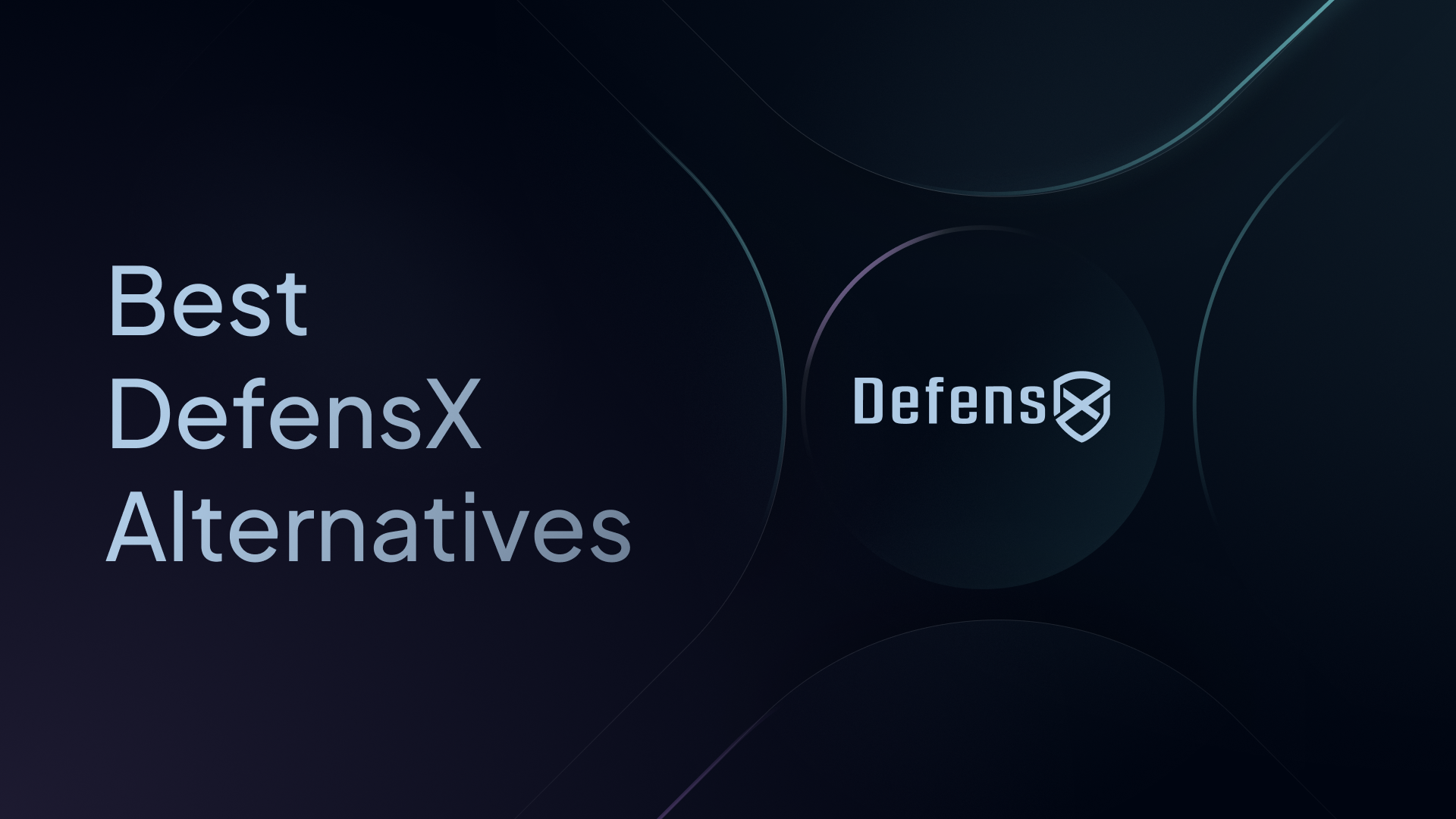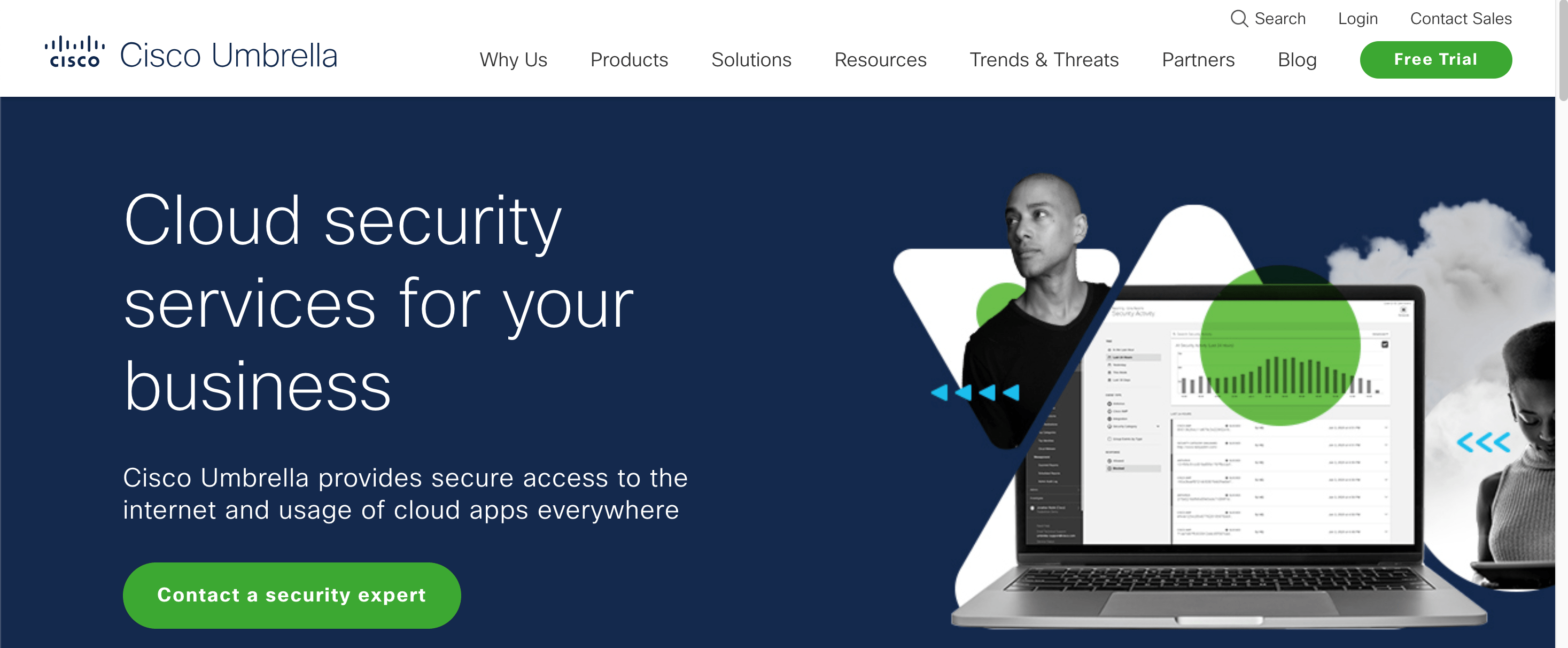8 Best DefensX Alternatives & Competitors
Our roundup of the best DefensX alternatives explores solutions that offer better features, compatibility, product roadmap, and pricing.

There are distinct limitations to DefensX, such as the lack of comprehensive features and compatibility, slow product development cycle, and tiered pricing model.
This is surprising since DefensX is a well-known name in the DNS security space, particularly for MSPs, which are its target audience.
But is it the only viable option available to you?
As we’ll explore in this article, there are plenty of alternatives to choose from, with some having far greater functionality and flexibility on offer than DefensX.
1. Control D (Best All-Round Solution)
Control D is the best DefensX alternative since it has more features, offers granular control and customization over your DNS configurations, and provides greater compatibility across multiple device types to ensure your entire organization is fully protected.
Let’s dive into the details.
Pricing
Unfortunately, DefensX discloses very little information regarding its pricing structure; for that, you’ll have to book a demo with their sales team first. But it’s important to mention that you can purchase DefensX from Pax8.
We do know that they have three tiered plans on offer – Core, Core+, and Premium. The Core plan is simply a secure DNS filter, the Core+ plan integrates its secure browser feature, and the Premium plan includes zero-trust functionality and resilience reporting.
Control D rejects this approach entirely by not only being transparent with their pricing but also abandoning the tiered pricing model. Control D offers no plans; instead, it offers the full suite of features to all organizations that sign up:
- School/Non-Profit: $0.50/endpoint/month
- MSP: $1/endpoint/month
- SMB: $2/endpoint/month
- Enterprise: Contact
This also means that all users are eligible for future feature releases and upgrades at no extra cost, giving you the peace of mind that you’ll always have full functionality of Control D at all times.
As such, Control D wins this category due to its transparent pricing model and not gatekeeping features for different plans/users.
Features
Since both services offer DNS-based protection, there’s some overlap between the two services regarding the features offered. However, there are also some key differences.
Features offered by DefensX that are not yet available with Control D include:
- Remote Browser Isolation – on the Premium plan
On the flip side, there are numerous features exclusive to Control D that DefensX does not offer:
- Advanced machine learning-based malware protection – An independent test found that Control D’s malware filter scores an industry-leading 99.97% block rate
- More blockable services – Control D has over 1,000 apps, platforms, and groups of websites to choose from, whereas DefensX’s selection is significantly lower.
- Geo-Custom rules
- Traffic redirection
- Can be deployed on a network or router
- Full API access – DefensX only makes this available for the Core+ and Premium plan.
Overall, Control D eclipses DefensX in terms of the depth and breadth of features it offers, allowing for granular control over your DNS configurations.
Another thing to consider is the product development cycle. Reviews have mentioned that DefensX is slow in introducing new and important features, which can be a major drawback.
Considering these factors, Control D wins this category.
Onboarding & UX
DefensX has the traditional enterprise-focused user interface (UI), which many businesses will be familiar with. However, that doesn’t mean that it’s clunky or inefficient; implementing DefensX is simple, with multiple video walkthroughs that help you get up to speed.
Control D’s UI looks completely different on the surface. They have taken a different approach by building the service with user experience in mind first and working backward from there, with users praising how intuitive and easy the platform is to use. Their Dashboard has also recently undergone a complete UI overhaul to streamline onboarding and DNS management further.
Analytics & Reporting
Both services offer the ability to view full query log data, export query log data, generate per-user reports, and view admin action logs. Control D also allows for SIEM log streaming and scheduled reporting, but this is only available on DefensX’s Core+ or Premium plan.
Control D offers three data storage regions – NA, EU, or ANZ – and gives you the option to select a custom storage region (at an additional cost), something which DefensX does not offer.
However, it should be noted that sometimes DefensX blocks things without logging them, which can present challenges when troubleshooting issues.
Although both Control D and DefensX match up well in this category, Control D takes a slight edge.
Support
Control D and DefensX both offer detailed documentation, email, and chat support. However, Control D’s chat support functions differently.
Control D utilizes an advanced chatbot named Barry. It is powered by machine learning technology that builds upon all the information in its documentation and the collective knowledge of all Control D employees, meaning Barry can answer almost all queries within seconds.
A key difference between both services is that Control D offers community support with active users on Reddit and Discord. They also have a Suggest a Feature service that users can vote on and ask questions.
However, it’s important to mention that both Control D and DefensX are consistently praised for their high-quality customer support.
Overall, we’ve given the nod to Control D in this category due to its chat support feature and community support, both of which are not offered by DefensX.
Final Thoughts
DefensX may satisfy basic MSP needs with its current feature set and reliable customer support. However, those looking for advanced features, granular customization, and regular product updates at an affordable price point will find Control D’s value proposition more appealing.

2. DNSFilter
DNSFilter offers a strong suite of features, including advanced AI-driven malware protection, customizable content filtering, 80+ blockable Services, and comprehensive query logging.
However, there are some limitations. DNSFilter does not support Linux, lacks full modern DNS protocol support, and does not offer dual-stack functionality, which could limit compatibility in certain environments.
One thing to note is that DNSFilter is recognized for its rapid DNS query response times – often battling Cloudflare for the number one spot – making it a go-to for users who prioritize minimal latency. But, it can be argued that this comes at the cost of performance consistency.
DNSFilter’s server performance consistently ranks in the lower third of all competitors when it comes to server uptime and reliability, which can significantly impact your browsing experience.
The service is also priced at a premium, with additional charges for features some may view as essential, such as SIEM integration and permanent API token access. These features cost an extra $0.25/user/month in addition to the $2/user/month rate on the Pro Plan.
While these constraints may be a downside for some, DNSFilter remains a fast, feature-rich alternative for those needing strong content filtering capabilities and fast query speeds.
👉 Read our head-to-head comparison of Control D vs DNSFilter
3. WebTitan
WebTitan delivers essential features tailored for small organizations and MSPs. It provides:
- Robust malware detection
- Web filtering
- Detailed per-user reporting
- API access for seamless integration
However, WebTitan has some limitations. It does not support Geo-IP blocking or region-based customization, nor does it offer a list of blockable Services that can be used to block or redirect specific apps, which can restrict how much control you have over your network configurations.
For instance, you may want to block all social media except X (Twitter). While you can block the social media category and create a rule that allows X to be resolved, this can get cumbersome when you have multiple platforms in different categories.
Control D – which has a list of 1,000+ blockable Services – allows you to block/redirect individual apps, websites, and platforms in the Dashboard without creating a specific rule for each. This means you never have to spend more than a few clicks managing your DNS settings, ensuring your experience is quick and seamless.
Regarding pricing, WebTitan comes in at $2.25/user/month (paid annually) for businesses, which makes it more expensive than Control D and DNSFilter above.
Overall, the service is still a dependable choice for MSPs and organizations with basic needs. However, you may want to look elsewhere for additional customization and more features at a similar price point.
4. Zorus
Zorus is another DNS filtering solution designed with MSPs in mind. Targeted towards those who are seeking essential features without added complexity, Zorus’s features include:
- Malware and phishing protection
- Customizable content filtering
- Geo-IP blocking
- Full API access
- RMM integration
- Scheduled Reporting
However, Zorus has some limitations. It currently lacks support for Android and iOS devices, its MacOS client is still in beta, and it does not offer SIEM log streaming. It also does not offer Traffic Redirection which can be a handy feature.
For businesses seeking basic DNS filtering without advanced features or broader device compatibility, Zorus presents a reliable, no-frills option that can get the job done. But, if extensive analytics and logging or compatibility across all types of devices is needed, then Zorus may not be the best choice for you.
5. ScoutDNS
ScoutDNS is a dependable DNS filtering solution that offers the usual web filtering and threat protection. Its main features include customizable content filtering, adaptable allow/block lists for different clients or policies, and machine learning-based malware protection, which satisfies the needs of businesses requiring basic internet access control.
However, ScoutDNS has certain limitations that may affect users with more diverse or complex requirements:
- Lacks support for mobile devices like iOS and Android
- Does not support DNS-over-TLS (DoT) protocol support
- Does not offer advanced features such as Geo-custom Rules or Traffic Redirection.
While ScoutDNS provides DNS filtering for basic needs, it may not fully meet the requirements of organizations looking for complete functionality and flexibility. For those with more complex demands, alternatives like Control D offer a broader set of capabilities at an affordable price.
6. SafeDNS
SafeDNS offers a comprehensive set of DNS filtering features. Users have three plans to choose from: Basic, Pro, and Pro+.
The Basic plan – priced at $1/user/month – provides core functionality, such as full API access, flexible content blocking, and basic malware and phishing protection, making it a solid option for straightforward DNS filtering needs.
The Pro plan at $1.8/user/month introduces features like per-user policies, mobile device compatibility, and Active Directory support.
The highest-tier Pro+ plan – priced at $2.5/user/month – adds SIEM integration, which can be valuable for organizations needing in-depth data handling and reporting.
While SafeDNS doesn’t currently offer Geo-custom rules or Traffic Redirection, the service is well-regarded for its responsive customer support, which has been praised for quick resolutions and assistance.
7. Cloudflare Gateway
Cloudflare Gateway – part of the Zero Trust suite – is a DNS filtering solution that caters largely to enterprises.
With three pricing options – Free, Pay-as-you-go, and Contract – users have the ability to select a plan based on their use case.
However, the Free plan has notable limitations, such as limited query logging and no dedicated support, which often prompts businesses to upgrade to the Pay-as-you-go plan at $7/user/month.
This higher-priced plan offers several features, including:
- Malware and phishing protection
- Full API capabilities
- Full query logging
- Geo-IP blocking for location-based filtering
- Integration with RMM tools
To unlock SIEM log streaming and per-user reporting, businesses must upgrade to the Contract plan. The Contract plan is a custom pricing model typically reserved for large enterprises, which means it likely comes with a price tag to match.
Cloudflare Gateway provides a robust feature set that is ideal for large organizations with extensive security budgets. However, for companies seeking similar capabilities at a lower cost, alternatives like Control D deliver similar – or even more – features for as little as $2/user/month, with MSPs, non-profits, and schools getting an even lower rate.
👉 Check out our post on the 8 best Cloudflare DNS alternatives.
8. Cisco Umbrella

Note: An important upcoming change is the retirement of Cisco’s current Roaming Client, which will reach end-of-life on April 2, 2025.
Cisco Umbrella is a DNS security solution tailored primarily to large enterprises, offering a comprehensive suite of features like malware protection, Geo-IP filtering, and compatibility with multiple devices.
Built to work seamlessly with other Cisco products, Umbrella is most beneficial for organizations already using Cisco’s broader cybersecurity tools. This is because Umbrella’s functionality is only fully optimized when it's integrated within the Cisco ecosystem.
Umbrella’s service structure is divided into several tiers, including DNS Essentials, DNS Advantage, SIG Essentials, SIG Advantage, and Secure Access. This wide range of options can be daunting for new users, often requiring assistance from Cisco’s sales team to navigate and choose the best plan for their needs.
As mentioned earlier, users must migrate to the Cisco Secure Client, adding an extra step in an already confusing onboarding process.
While Cisco Umbrella is a solid option for enterprises invested in Cisco’s services, its multi-layered setup and complex onboarding process make it less ideal for organizations seeking a DNS filtering solution they can set up within minutes.
How Should You Choose the Right DefensX Alternative?
The best DefensX alternative should be considered against the following criteria:
- Pricing
- Features
- Customizability
- Onboarding & UX
- Analytics
- Support


